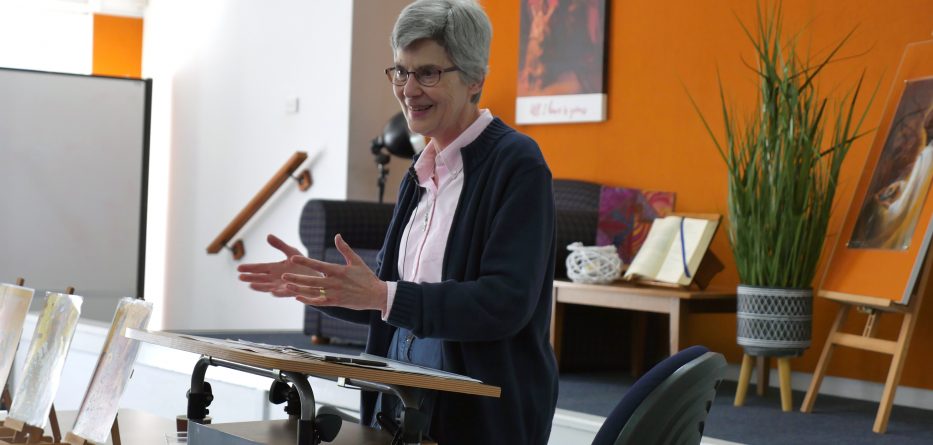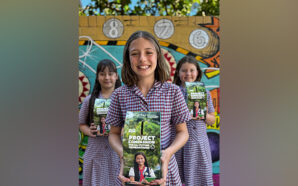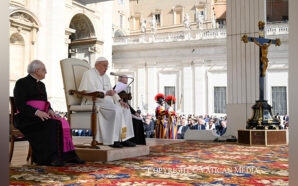RE-EVALUATING LIGHT AND DARK WITH SCRIPTURE SCHOLAR, AUTHOR AND POET DR BONNIE THURSTON
I will give you the treasures of darkness and riches hidden in secret places. (Isaiah 45:3)
When contemplating darkness, what thoughts or images come to mind? Do you have a knee-jerk reaction, causing you to think immediately, ‘It’s bad and should be avoided at all cost?’ Perhaps you visualised something or someone evil and ominous, a foreboding presence that caused you to shudder in fear. Or perhaps you imagined being enshrouded by a thick dark fog, blinded and lost, confused and afraid.
To imagine darkness in any of these ways is not uncommon according to American scripture scholar, author and poet Dr Bonnie Thurston, who was in Melbourne recently giving a lecture on ‘Poetic Musings Toward a Spiritual Theology of Darkness’ as part of the Dom Helder Camara Lecture Series. She explained darkness is the universal symbol of evil throughout the world’s religions and cultures.
‘Darkness is often assumed to be negative,’ she said. ‘It is unknown and so it requires a certain amount of risk and courage to explore what might be there. The big danger is—and we see it politically in many countries at the moment—that people make the assumption that what is unknown is dangerous and threatening and then act accordingly. If you assume that the darkness has something evil in it, or you react to it with fear, it leads to terrible consequences, both personally and in societies.’
In breaking open darkness in her lecture, Dr Thurston posed the following questions: ‘What if the challenge of darkness is simply an enigma, something unknown and neutral? What if unknown doesn’t necessarily mean dangerous? What would change if we re-imagined and shifted our expectations about darkness? What if we allowed the possibility that it contained revelation, gift, God, new life, resurrection? Suppose instead of unremitting suffering and evil, a source of radiance or healing was resident therein? Suppose darkness were a process, contained a Presence, offered a promise?
‘Certainly that would comfort the desperately ill, sufferers from emotional darkness and depression, and those who carry in their hearts humanity’s hurts, those vicarious sufferers who become our saints.
‘There’s something about the polarity of light and dark that is important, and you can’t have light if you don’t have darkness,’ she said. ‘My experience is that life gives people really dark experiences, and lots of good can come out of them. Think of the number of people who have had a brush with cancer and say, ‘It’s the best thing that ever happened to me because I’ve never taken my life for granted again. Every morning is a gift.’ There is something in the darkness of the cancer experience that woke them up to greater life.
‘For some people who have had a serious mental or psychological illness and have come through it with appropriate medication, hospitalisation and professional care, making it through that darkness has taught them things in their heart, in the centre of their being, that they would never have otherwise learned.
‘My husband died of cancer. I was widowed before I was 40. He had an incurable cancer and died within 14 months. That was really hard; it was a huge darkness. For about a year after he died I didn’t have anything to say to God. And then I started reading one psalm every day before I’d go out to teach. I left the Bible on the dining room table and before I’d leave, that’s what I could do. That was my entry back in. Several years later I suffered from depression because I hadn’t done the grieving. I had put it in a box, which then started to leak. So that was quite a difficult time. I can’t say that I’m happy about either of those experiences, but I wouldn’t give them up for the world now because they’ve made me who I am. The light in the darkness is a profoundly formative experience if we can wait for it.’
Dr Thurston suggested that darkness also has other possibilities. ‘Theologically, darkness is that from which everything else comes’, she said. ‘In Genesis 1, God created from a formless void and darkness. From the darkness that covered the face of the deep, God drew the light that was good, thereby retaining both light and darkness.
‘Presumably, God could have obliterated darkness and night, and left only day, but day and night seemed to offer a necessary polarity. In a reflection, “The Call of St Matthew”, in Sauntering Through Scripture, Benedictine sister Genevieve Glen suggests that “the primal chaos was not nothingness. It was possibility. God looked upon it with love … The formless void, the dark waters, proved to be in fact a seething cauldron of prospects awaiting only God’s creative word to leap into actuality as sun, moon, stars, and all the rest of creation.”
‘Similarly, Professor Dale Allison’s The Luminous Dusk reminds us that the Bible “speaks of God dwelling in thick darkness”. Preparing to receive the Tables of the Law, Moses drew near to the thick darkness where God was (Exodus 20:21). King Solomon declared, “The Lord has said that he would dwell in thick darkness” (1 Kings 8:12).
‘One could multiply references to darkness as God’s dwelling place,’ said Dr Thurston. ‘As Dale Allison says with such clarity, “God is a mystery. This is reason to love the dark.” If God retained darkness at creation and dwells therein, darkness cannot be unremittingly negative. Again Allison: “God hides in the darkness, so to the darkness we must go”.’
Dr Thurston explained that the obvious Christian example of the requirement of darkness and death is Jesus’ passion. ‘Think of how darkness functions in that narrative,’ she said. ‘Matthew’s Gospel reports “From noon on, darkness came over the whole land. From 3:00 on Good Friday until Easter morning there was an utter cosmic darkness, beginning with the emotional darkness of Jesus’ friends. But something remarkable was gestating in the dark womb of Holy Saturday only to be revealed, according to St John, “early on the first day of the week, while it was still dark … And when it was evening on that day … Jesus came and stood among the disciples”. Other gospel witnesses to the Resurrection speak of Jesus’ appearance in early dawning or dawn, not full light. The greatest mystery of all, the Resurrection of Jesus, took place in darkness.
‘In human life and community, darkness seems not optional, but required. “Things” are resident therein that can be found only there,’ Dr Thurston said. ‘We don’t desire darkness or choose it. Rather, darkness comes to us in life. You have to suck it up and walk in. And it’s usually in hindsight, looking back, that we see the light in the darkness.
‘We are being invited to trust the darkness and the mystery of God’s presence in the darkness.’
In her lecture, Dr Thurston stated, ‘Through the prophet Isaiah, God announces, “I will give you the treasures of darkness and riches hidden in secret places” (45:3). The exact nature of the treasure will be different for every person who enters private and/or communal darkness.’
She quoted African American author James Baldwin, who in his 1957 novel Sonny’s Blues, writes, ‘For while the tale of how we suffer, and how we are delighted, and how we triumph is never new, it always must be heard. There isn’t any other tale to tell, it’s the only light we’ve got in all this darkness’.
In concluding, Dr Thurston said, ‘Our most enlightening poets, teachers, preachers and wisdom figures tell variations of the tale of finding light in darkness. Waiting for, articulating light in darkness may be the light in darkness, and the darkness itself the secret of radiance. I give the last word to Meister Eckhart: “Where understanding and desire end, there is darkness and there God’s radiance begins”.’
Retreat Day, Newman College, Melbourne
You are resident here
in the hush between talks.
Three times we hack our way
through thickets of thought.
But You are present
in the gentle wave of wind,
the slow undulation
of the long, green leaves
beyond leaded windows
of the old oratory,
once a college chapel.
In this deep stillness
ancestral holiness leaches
from walls, rises from floor.
No matter how brave and deep,
the meditations distract.
You are always resident,
the interstices between
words and Word,
incipient everywhere, waiting
[Bonnie Thurston]
Dr Bonnie Thurston spent a month in Australia during May and June as a guest of the Association of St Marcellin Champagnat and Newman College. During this time she gave the Association’s annual Marian Lecture and provided a lecture and retreat day as part of the Dom Helder Camara Lecture Series in Melbourne. For a full copy of Dr Thurston’s Helder Camara lecture, email mark.oconnor@marists.org.au.
Fiona Basile is a Melbourne-based freelance photojournalist with a passion for words, photography and travel.
This article was originally published in the July 2019 edition of the Melbourne Catholic Magazine.
With thanks to Melbourne Catholic Magazine and the Archdiocese of Melbourne.








